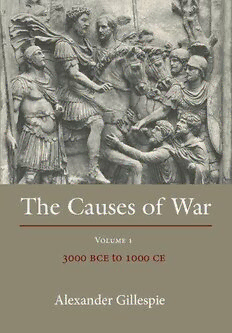
The Causes of War: Volume I: 3000 BCE to 1000 CE PDF
Preview The Causes of War: Volume I: 3000 BCE to 1000 CE
Alexander Gillespie is Pro Vice-Chancellor for Research and Professor of Law at the University of Waikato, New Zealand. The Causes of War Volume 1 3000 bce to 1000 ce Alexander Gillespie Cover image Marcus Arelius on Horse © Bettmann/CORBIS THE CAUSES OF WAR: 3000 BCE TO 1000 CE This is the first volume of a projected four-volume series charting the causes of war from 3000 BCE to the present day, written by a leading international lawyer, and using as its principal materials the documentary history of international law largely in the form of treaties and the negotiations which led up to them. These volumes seek to show why millions of people, over thousands of years, slayed each other. In departing from the various theories put forward by historians, anthropologists and psychologists, Gillespie offers a different taxonomy of the causes of war, focusing on the broader set- tings of politics, religion, migrations and empire-building. These four contexts were dominant and often overlapping justifications for the first four thousand years of human civilisation for which written records exist. The Causes of War Volume 1 3000 BCE to 1000 CE Alexander Gillespie OXFORD AND PORTLAND, OREGON 2013 Published in the United Kingdom by Hart Publishing Ltd 16C Worcester Place, Oxford, OX1 2JW Telephone: +44 (0)1865 517530 Fax: +44 (0)1865 510710 E-mail: [email protected] Website: http://www.hartpub.co.uk Published in North America (US and Canada) by Hart Publishing c/o International Specialized Book Services 920 NE 58th Avenue, Suite 300 Portland, OR 97213-3786 USA Tel: +1 503 287 3093 or toll-free: (1) 800 944 6190 Fax: +1 503 280 8832 E-mail: [email protected] Website: http://www.isbs.com © Alexander Gillespie 2013 Alexander Gillespie has asserted his right under the Copyright, Designs and Patents Act 1988, to be identified as the author of this work. All rights reserved. No part of this publication may be reproduced, stored in a retrieval system, or transmitted, in any form or by any means, without the prior permission of Hart Publishing, or as expressly permitted by law or under the terms agreed with the appropriate reprographic rights organisation. Enquiries concerning reproduction which may not be covered by the above should be addressed to Hart Publishing Ltd at the address above. British Library Cataloguing in Publication Data Data Available ISBN: 978-1-84946-500-7 ISBN (ePDF): 978-1-78225-208-5 This work is for Claire, for the love, the family and the journey we have made and shared. Table of Contents I. Introduction 1 1. The Conversation on Sunday Afternoon 1 2. Utopia 1 3. Facts 4 4. Casus Belli in Practice 4 II. Empires 7 1. Introduction 7 2. The Formation of Empires 7 A. India 7 B. China 10 3. The Middle East 15 A. Egypt and Nubia 15 B. Egypt, Mesopotamia and the Hittites 17 C. Egypt, Canaan, Assyria, Babylon and the Rise of Persia 20 4. Greece 26 A. Greece and Carthage 26 B. Greece and Persia 29 5. Rome 35 A. The Formation of Rome 35 B. Rome and Carthage 40 C. Rome and Europe 46 6. The Formation of Modern Europe 66 7. Conclusion 71 III. Migratory Peoples 77 1. Introduction 77 2. Egypt 77 3. India 79 4. China 80 5. Rome 83 6. Further Migratory Peoples in the West to 1000 94 7. Byzantium 98 8. Northern Europe 103 9. Conclusion 107 viii Table of Contents IV. Politics 109 1. Introduction 109 2. The Near East, Egypt, China and India 109 A. Monarchy 109 B. Usurping Power 113 C. The Standards of Monarchy 118 D. Slavery 122 3. The Greeks and the Wars for Freedom 125 A. Democracy 125 B. The Limits of Citizenship 129 C. Autonomy, Monarchy and the Rise of Rome 131 4. Rome and the Political Question 145 A. Monarchy 146 B. The Senate and the Plebs 147 C. Slavery 151 D. The End of the Republic 153 E. Caesar 154 F. Augustus 157 G. The Principate 160 H. The Emperor in Practice 162 5. The Contribution of Christianity 166 6. The Christian Emperors of the Roman Empire 170 7. The Return to Monarchy in the West 174 8. Islam and the Political Question 180 A. Authority 180 B. Slavery 181 9. Conclusion 183 V. Religion 185 1. Introduction 185 2. Mesopotamia, Egypt, Assyria, Israel and Persia 185 3. China and India 189 4. Greece and Rome 194 A. The Jewish People 196 B. Christians 198 5. Christianity 201 6. Orthodoxy, Heresy and Intolerance 204 A. Arians and Paulicians 204 B. Jews 207 C. Pagans 208 7. The Rise of the Papacy and the East–West Tension 211 8. The Religious Question between Rome and Persia 215
